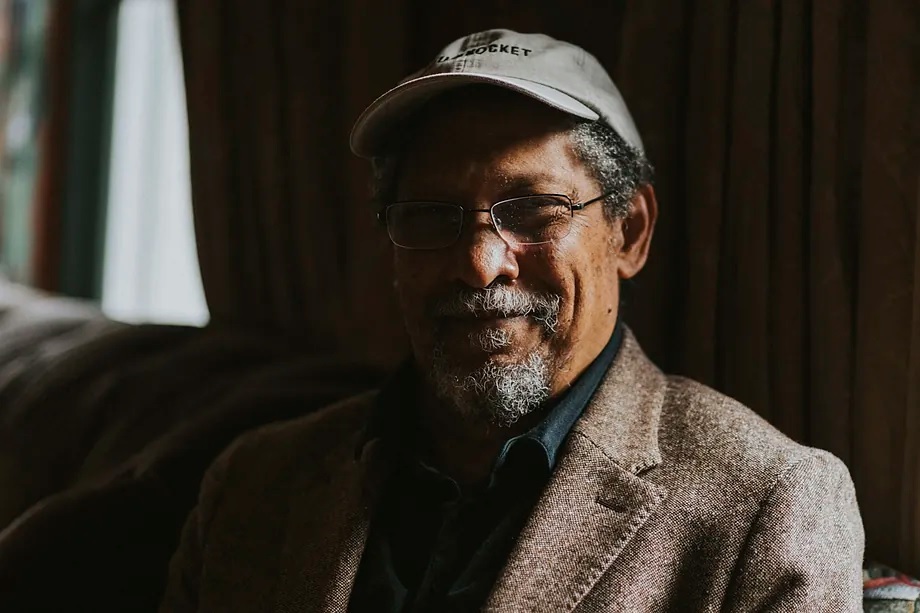Percival Everett was born in the deep South of the United States (Georgia, 1956) but has been based in California for some time. From there, he looks at the present and past of his country with his "pathologically ironic" gaze, capable of humorously recounting the tragic era of lynchings (The Trees), denouncing racism in the publishing world (Cancelled, adapted to film as American Fiction), or swimming against the current in James, the bold remake of The Adventures of Huckleberry Finn from the slave's perspective published by De Conatus. The double finalist of the Booker Prize - award that last week recognized Samantha Harvey with her work Orbital - speaks with EL MUNDO in London. From there, he briefly reviews his extensive literary work, the aftermath of slavery in the country of his birth, and the return of Donald Trump, the President-elect of the United States whose team acknowledges that he does not read books.
Question. A critic once said that you were "born to write James," do you agree with that statement?
Answer. Maybe that's too much to say. I would say that I was born to write books, and James is number 30.
Q. Do you have a special preference for the novel that has been considered the best novel of 2024 in many literary lists?
A. Not really. An award or a critique doesn't make your work better. To me, it's not very different from my other books, nor do I feel a special connection. It has had its own life, perhaps longer than others. But I have already turned the page.
Q. You have acknowledged, however, that you couldn't have written it before, that it came at the right time, as a writer and as a person.
A. Books happen for reasons that sometimes escape us. If I had written it ten years ago, it wouldn't be the same novel, it might have been worse.
Q. Is it true that the original idea came to you while playing tennis, hitting a cross backhand that went out of bounds?
A. That's right. And the ball went out, I would say, by more than a meter... At that moment, I stopped and thought: 'Has anyone ever written The Adventures of Huckleberry Finn from the slave's point of view?' I did some research in the library, saw that there were many studies about Jim, but not the novel narrated from his perspective. I was looking forward to reading it, and that's why I started writing it.
Q. Is there any of your old admiration for Mark Twain left after reading his novel 15 times in a row?
I had to do it to achieve total immersion in the time and place. But I admit that I ended up fed up with the book, and I wouldn't be able to read it for the sixteenth time. I still believe it is an important work in its historical context, but there are many clichés about the character of the slave Jim that do not stand the test of time.
Q. Your great-grandmother was a slave.
A. Yes, in Texas. She gained freedom in 1864. That's how close we still are to slavery, which was the basis of my country's economic prosperity. Slave owners were compensated, but it has taken a century and a half for talk of reparations for those who bore the burden.
"Trump has no ideology, beyond greed and serving his own interests."
Q. There is a historical revisionism beginning in the Southern states.
A. Yes, there is a kind of denial of slavery spreading in the United States, with Texas at the forefront. It has even been proposed to replace the word slavery in the educational curriculum with "involuntary relocation." That's the point we're reaching.
Q. Is Donald Trump a white supremacist?
A. I think Trump has no ideology, beyond greed and serving his own interests. All he wants is more money and more power.
Q. After his election, there was a flood of racist messages on social media inciting African Americans to "go back to the plantation."
A. That's the problem: Trump is not the disease, he is the symptom. In the best-case scenario, his reelection could serve to wake Americans up. In the worst-case scenario, it will be the end of democracy as we know it.
Q. His collaborators have revealed that Trump does not read books.
A. The first thing they do in fascist regimes is to ban and burn books.
Q. Is race still the great dividing line in the United States?
A. It has always been so. Race is our great unfinished business. It has been with African Americans and continues to be with people of color who sustain our economy.
Q. How do you explain the Latino vote in favor of Trump?
A. When people are afraid, they believe the lies they are told.
Q. And the failure of Democrat Kamala Harris?
A. Kamala Harris was not elected because men did not want her as president. There is also a problem of misogyny in our country that we have not wanted to acknowledge.
